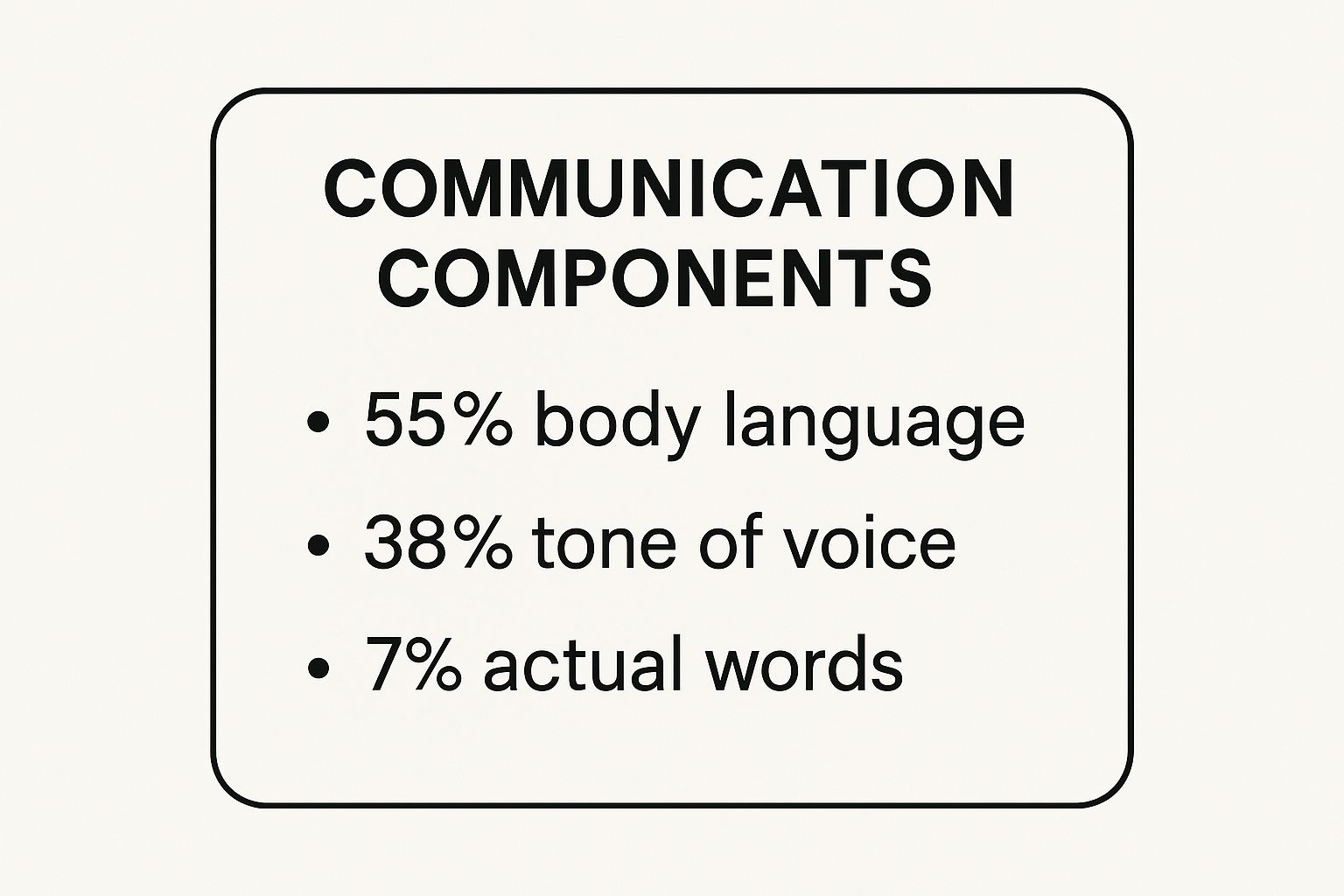A Modern Guide on How to Be a Better Husband
If you want to be a better husband, the single most powerful shift you can make is this: stop focusing on grand, infrequent gestures and start prioritizing consistent, daily actions.
It's about intentional communication, being a true partner in the chaos of daily life, and providing emotional support that your wife can count on, day in and day out. This isn't about a scorecard or a list of your shortcomings; it's a practical toolkit for building a resilient, modern marriage.
The Blueprint for a Resilient Modern Marriage
Forget the outdated advice. Being a great husband isn't about one heroic act. It’s about showing up every single day in small but meaningful ways that build a deep foundation of trust, respect, and genuine connection. This is about creating a marriage that doesn't just survive the pressures of work and fatherhood, but actually thrives because of the partnership you build.
It all starts with understanding what really moves the needle in your relationship.
Communication Is More Than Just Talking
This might be the most crucial piece of the puzzle. Solid communication is the absolute bedrock of a happy marriage. In fact, research points to a staggering 65% of divorces being linked to communication breakdowns. It's often the first domino to fall. (Source)
It’s easy to get this wrong. We think communication is just about the words we say, but the real magic happens when you start paying attention to what isn't being said.
Check this out:

That's right. Your tone and body language are screaming louder than your actual words. Noticing these nonverbal cues is a game-changer for connecting with your wife on a deeper level.
Here’s a mistake I’ve made a hundred times: jumping straight into problem-solving mode when my wife just needed me to listen. Validating her feelings first creates the emotional safety net you both need before you can even think about finding a solution together.
The Three Pillars of a Stronger Partnership
When you boil it all down, learning how to be a better husband and father comes down to getting these three areas right. Nail these, and you'll transform your relationship.
- Intentional Communication: This is about listening to understand, not just to cook up your reply. It means putting the phone down, making eye contact, and showing her she has your undivided attention.
- Active Partnership: It's time to graduate from "helping out." An active partner takes initiative. He co-owns the mental load of running the household and handles his responsibilities without needing a reminder.
- Unwavering Emotional Support: Be her safe harbor. This is about providing comfort, validating her feelings (even if you don't fully understand them), and being her biggest fan, especially when life throws a curveball.
These pillars don't exist in a vacuum; they're completely intertwined. Being an active partner, for instance, is a powerful form of non-verbal communication that says, "I see you, and I'm with you." You can't offer real emotional support if you haven't mastered the art of listening.
To help you visualize how these concepts work together, here’s a quick summary of the core principles for becoming the husband your family deserves.
Key Pillars of a Modern Husband
| Pillar | Core Action | Impact on Your Marriage |
|---|---|---|
| Intentional Communication | Listening to understand, not just to reply. Being fully present during conversations. | Builds deep trust and emotional intimacy. Prevents misunderstandings from escalating. |
| Active Partnership | Taking initiative with household and family tasks. Sharing the mental load. | Reduces your wife's stress and burnout. Creates a sense of teamwork and fairness. |
| Emotional Support | Validating her feelings and being her confidant. Offering comfort, not just solutions. | Makes her feel safe, seen, and unconditionally loved. Strengthens your bond during tough times. |
Focusing on these three areas is the most direct path to a stronger, more connected marriage. It’s not about being perfect, but about being present and intentional in the moments that matter most.
Mastering Communication Beyond Just Talking

Strong communication is the engine of a good marriage. We all know this. But for busy working dads, it’s often the first thing to break down when life gets crazy.
By the end of the day, you're both running on fumes. The kids are bouncing off the walls, and the thought of having a deep conversation feels like climbing a mountain. Talking about anything more than who's handling school pickup tomorrow seems impossible.
But here’s the secret: real connection isn't about talking more. It's about listening differently. It’s about making your wife feel truly heard, not just processed. This is how you stop feeling like roommates and start feeling like partners again.
Listen for the Emotion, Not Just the Words
I get it. Our natural instinct as guys is to fix things. Your wife mentions she's swamped with the kids' summer camp logistics, and your brain immediately jumps to opening a spreadsheet. Problem, meet solution.
While your heart is in the right place, this usually misses the mark completely. She’s not always looking for you to solve the problem; she’s looking for you to see her in the problem. She wants you to hear the exhaustion in her voice and acknowledge the mental load she’s carrying.
Next time she shares a struggle, try this first:
- Pause. Don't offer a solution right away. Just listen.
- Name the feeling. Try to identify the emotion she's expressing.
- Reflect it back. Say something like, "It sounds like you're feeling completely overwhelmed by all that planning," or "Wow, that sounds incredibly frustrating."
This simple act of validation is powerful. It tells her you’re on her team and that you're listening to her heart, not just her to-do list.
De-Escalate Tension Before It Explodes
Arguments are going to happen. But a lot of them can be defused before they turn into full-blown fights. When disagreements pop up—especially over hot topics like money or parenting styles—it’s easy to get sucked into a battle of who's right.
Your goal isn't to win the argument. It's to understand your partner.
Certain phrases are like a pressure release valve in a tense moment:
- "Help me understand your point of view on this."
- "What I'm hearing you say is… is that right?"
- "I can see why you feel that way."
- "We're on the same team here. Let's figure this out together."
Using these doesn’t mean you agree with her. It just signals that you respect her enough to listen, which immediately lowers her defenses and opens the door to a real conversation.
Relationship expert Dr. John Gottman discovered what he calls the "5-to-1 ratio." For every one negative interaction during a conflict, stable and happy couples have five or more positive interactions. This can be as simple as a touch on the arm, a shared laugh, or even just a nod of understanding.
Build a Stronger Connection with Daily Habits
Great communication isn't just for serious talks. It’s built in the small, everyday moments. These little habits create a foundation of connection that makes the tough conversations a whole lot easier.
Real-World Scenario: You Disagree on Parenting
Let's say your wife is stricter about screen time than you are. Instead of just letting the kids have extra time when she's not looking, try this approach. Say, "I know we have different ideas about screen time. Can we find 15 minutes tonight to come up with a plan we both feel good about?" This respects her position and frames the two of you as a collaborative team.
For those bigger, recurring topics that always seem to cause friction, having a bit of structure can be a game-changer. Using a simple family meeting agenda can turn chaotic, stressful check-ins into productive sessions where you both walk away feeling heard.
By focusing on listening to understand, validating her feelings, and using language that cools things down, you're not just dodging fights. You're building a deeper, more resilient marriage. You're showing up as the supportive, engaged partner she fell in love with, especially when life is at its most demanding.
Becoming an Active Partner, Not Just a Helper

There’s a huge difference between "helping out" around the house and being a true partner. One is about doing a task when you’re asked. The other is about co-owning the responsibility for the life you’re building together. To be a better husband, you have to graduate from helper to partner.
When your wife asks, "Can you help me with the dishes?" she’s not just asking you to wash some plates. She’s often signaling that the entire weight of planning, managing, and executing the task has fallen on her. This invisible work is what experts call the mental load.
That invisible labor is a massive source of burnout and resentment in many marriages. Shifting this dynamic isn't just about doing more chores; it’s about taking more initiative.
Moving From Reactive to Proactive
Being a partner means you see a need and you fill it—without being asked. It’s the difference between asking, "What can I do?" and saying, "I've got this." A helper waits for instructions. A partner takes ownership of entire domains of family life.
This proactive approach is one of the most powerful ways you can show love and respect. It sends a clear message: "Your peace of mind is as important as mine. I see everything you do, and I'm here to share the load, not just lighten it occasionally."
The truth is, many of us were never taught how to do this. We saw a model where one person managed the household and the other "helped." But that model just doesn't work for modern families where both partners are often juggling careers, parenting, and personal goals.
This shift has a real, measurable impact. Emotional support and shared responsibility are key drivers of a great marriage. In fact, studies show that couples where husbands actively participate in household tasks report relationship satisfaction rates that are 20%-30% higher than in more traditional setups. You can dig into more of the data by exploring these marriage statistics and findings.
Owning Your Domains
The most effective way to start is by taking complete ownership of a few specific areas. This isn’t about splitting every single task 50/50. It’s about creating systems where you are the default person responsible for certain outcomes, from start to finish.
Think about what "ownership" really means. Let's use "making dinner" as an example.
The Helper's Approach vs. The Partner's Approach
| Task Component | The Helper | The Partner (Owner) |
|---|---|---|
| Planning | Asks "What's for dinner?" | Plans the week's meals on Sunday. |
| Inventory | Asks "Do we have any chicken?" | Checks the fridge and pantry to see what's needed. |
| Shopping | Goes to the store with a list someone else made. | Creates the grocery list and does the shopping. |
| Execution | Cooks the meal after being asked. | Knows it's Tuesday, so it's taco night, and starts cooking. |
| Cleanup | Might help with dishes if prompted. | Cleans up the kitchen as part of the dinner process. |
See the difference? The partner owns the entire process. This completely removes the mental load from your wife for that specific domain.
Practical Systems for Shared Management
You don't have to overhaul your entire life overnight. Just start by choosing one or two areas to fully own. Here are some real-world ideas to get you started:
- Shared Digital Calendar: Set up a shared Google or Apple Calendar on your phones. You become responsible for adding and tracking all the kids' soccer practices, doctor's appointments, and school events. You own the reminders and the logistics.
- Weekly Meal Planning: Take charge of planning dinners for the week. This means you’re the one checking recipes, making the grocery list, and doing the shopping every Saturday morning.
- Morning Routine Management: Own the morning chaos. Your job is to get the kids dressed, fed, and have their backpacks ready so your wife can focus on getting herself ready for work.
- Bill and Financial Tracking: Take the lead on paying monthly bills. You set up the payment reminders, track due dates, and give a weekly update on the family budget.
By building these shared systems, you stop being a subordinate in your own home and become a co-manager. You move beyond simply doing tasks and start contributing to the peace and order of your household. This kind of initiative is a form of love and respect that speaks volumes, building a foundation of true teamwork that will make your marriage stronger than ever.
Providing Consistent Emotional Security
Emotional security is the bedrock of a strong marriage. It’s the deep-down feeling your wife has knowing she can be completely herself with you—messy, frustrated, joyful, or scared—and you’ll be her constant, stable presence through it all.
For a lot of guys, our first instinct is to jump in and fix things. But learning how to be a better husband often means learning to support instead of solve. This isn't about grand, movie-style gestures. It's about creating a safe harbor in the small, everyday moments. It's the quiet confidence she feels knowing you’re in her corner, no matter what.
This kind of safety doesn't just appear out of nowhere. You have to build it, one validating conversation and one supportive action at a time.
Validate Her Feelings Before You Offer Solutions
One of the fastest ways to make your wife feel completely alone is to treat her feelings like a problem you need to fix. When she comes to you stressed about work or overwhelmed by the kids' schedules, she’s usually not looking for a five-point action plan. She’s looking for connection. For understanding.
Your first move should always be validation. That’s it. Just acknowledge her emotion as real and legitimate, even if you don't fully get it or agree with her take on the situation.
Key Takeaway: Validation isn't the same as agreement. It's about respect. Saying, "That sounds incredibly frustrating," or "I can see why you're so worried about that," doesn't mean you think she's 100% right. It just means you respect her right to feel that way.
This one simple shift from fixing to validating is a game-changer. It tells her she is seen and heard on an emotional level, which is the foundation of genuine security.
Learn to Speak Her Emotional Language
Just like people have different love languages, we also have different ways of feeling emotionally supported. What makes you feel secure might be the total opposite of what she needs. The key is to stop assuming you know and start paying attention.
What does she respond to best when she's stressed?
- Vocal Encouragement? Hearing you say, "You're handling this so well," or "I'm so proud of you," might be exactly what she needs.
- Physical Comfort? Sometimes, a long, meaningful hug after a tough day says more than words ever could. It’s a non-verbal way of saying, "I'm here, and we're in this together."
- Acts of Service? Taking a task off her plate without being asked can be a powerful signal of support. It shows you’re paying attention to her stress levels and stepping in to help.
Watch for what actually makes her visibly relax or soften. That’s her emotional language. Learning to speak it fluently is a superpower in a marriage.
Be Her Most Vocal Supporter
In a world that can be critical and demanding, your wife needs to know that you are her number one fan. This means celebrating her wins, both big and small, and having her back when it counts. Be the guy who brags about her accomplishments to your friends and family.
It also means being her advocate during disagreements with others. Even if you need to hash out the details in private later, presenting a united front reinforces that you are a team. This public and private support system is crucial for emotional security, especially when you’re navigating tricky family dynamics or tough career challenges.
Of course, conflicts will still come up between the two of you—that's just part of being married. Knowing how to repair the connection after a disagreement is just as important as trying to prevent them. If you’re looking for ways to handle those tough moments, our guide on healthy marriage conflict resolution offers practical strategies to get back on track.
When you create this consistent emotional safety net, it allows both of you to be vulnerable. And that’s where the deep connection really happens. It transforms your marriage from a partnership of logistics into a true sanctuary.
Nurturing Friendship and Intimacy Daily

Here’s a hard truth: a strong marriage is built on a real friendship. But when life gets jammed with work deadlines, kid pickups, and a never-ending list of chores, that friendship is usually the first thing to get sidelined. The easy laughs and late-night talks somehow get replaced by logistics and pure exhaustion.
A lot of guys fall into the trap of thinking they need some grand gesture—an expensive date night or a weekend away—to reconnect. Those things are great, don't get me wrong. But the real magic, the stuff that truly shows you're a great husband, happens in the small, everyday moments. It's about finding ways to nurture that connection when you've only got 15 minutes before you both pass out.
This isn’t about adding another stressful task to your already-packed schedule. It's about weaving connection into the life you're already living, proving that even in the chaos, you can still be her best friend.
Find Your 'Us Against the World' Moments
The couples who make it, the ones who seem truly unshakable, have a strong sense of "we-ness." It's that powerful feeling that no matter what life throws at you, you're a team facing it head-on. This bond isn’t forged in some big crisis; it’s built in the simple, quiet act of sharing experiences together.
Think about the little things that create a shared world just for the two of you.
- Pick a show to binge-watch. Make it your show. The only rule? You can only watch it together. This simple ritual gives you a guaranteed reason to sit on the couch next to each other and just breathe.
- Start a ridiculously simple hobby. It could be trying a new type of coffee every Saturday morning, doing the Sunday crossword together, or taking a 10-minute walk around the block after dinner. The activity itself is less important than the consistency of doing it together.
- Share an article or podcast. Hear something interesting on your commute? Send it to her. A quick text like, "This was fascinating, made me think of you. Let's chat about it tonight," shows she’s on your mind even when you're apart.
These small, shared rituals build a private culture inside your marriage. They create inside jokes and common ground that reinforce your core bond when life gets tough.
Prioritize Low-Effort, High-Impact Connection
You don't need a two-hour block for a "date night." You just need to be intentional with the small pockets of time you already have. The whole point is to make your wife feel seen and valued, even when you're both running on fumes.
A common mistake is waiting for the "perfect" time to connect. That time will never come. The secret is creating small, consistent moments of connection. Scheduling 15 minutes of tech-free talk time before bed can be more powerful than a fancy dinner once every three months.
You have to be a little creative to carve out these moments. For instance, after dinner, offer to clean up the kitchen so she can just sit and have a moment of peace. That small act of service not only takes something off her plate but also frees up her mental space, which often creates an opening for real connection later.
Make Reminiscing a Regular Habit
One of the easiest and most powerful ways to reconnect is to simply look back together. Talking about your shared history is like a cheat code—it reminds you both of the foundation you’ve built and why you fell for each other in the first place.
This doesn't need to be some big, scheduled event. Just spark a conversation while you're driving to the grocery store or getting ready for bed.
A few conversation starters to get you going:
- "Remember that disastrous first vacation we took? I still can't believe we…"
- "I was just thinking about our wedding day. What's your favorite memory from that night?"
- "What's the absolute funniest thing one of the kids has ever done?"
Recalling these stories unleashes a flood of positive emotions and strengthens your shared identity. It’s a powerful anchor, especially during stressful seasons, reminding you that your story is about so much more than just managing the day-to-day. It's an ongoing adventure.
Common Questions About Being a Better Husband
Taking that first step to become a better husband is a massive commitment. So it’s completely normal for a few questions—and maybe a little self-doubt—to creep in as you get started. You’re not just tweaking a few daily habits; you're actively working to rewire years of ingrained behaviors and expectations. That's tough work.
Let's tackle some of the most common roadblocks guys run into when they start putting these ideas into action. Think of this as your field guide for the real-world challenges you'll face.
What if My Wife Does Not Seem to Notice My Efforts?
This is one of the most common and, frankly, frustrating hurdles. You’re putting in the work. You're taking more initiative, listening more intently, and trying to be more present, but it feels like you're getting nothing back. Crickets.
The two most important words here are patience and consistency. Remember, if there's a history of certain dynamics or past hurts, it's going to take her a while to fully trust that these changes are the real deal. She might be cautiously watching from the sidelines, waiting to see if these new behaviors will actually stick around for the long haul.
Instead of getting discouraged, try to focus on the reason you're doing it, not the immediate need for a gold star. That said, it's also fair to open a conversation about it. You could try saying something gentle and non-confrontational, like, "I've been really trying to get ahead of the kids' schedules lately. I'm curious if it's making any difference for you?" This invites her perspective without sounding like you're just fishing for a compliment.
How Do We Find Time for Connection When We Are So Busy?
In the thick of career pressure and parenting chaos, the idea of a two-hour, traditional date night can feel completely out of reach. The key is to stop thinking about connection as a big event and start seeing it in the small, everyday moments.
Connection thrives in the little pockets of time you intentionally carve out.
- Try Micro-Dates: Forget two hours; aim for 15-20 minutes of focused, tech-free time. This could be having coffee together on the porch before the kids get up or just sitting on the couch after they’re in bed, without the TV on.
- Send Thoughtful Check-Ins: A simple text during a busy workday that says, "Thinking of you, hope that big meeting went well," shows her she’s on your mind.
- Create Shared Rituals: Make your morning coffee together every day. Or commit to a quick 10-minute walk around the block after dinner. It’s not about the activity; it’s about the consistency that builds your bond.
Shift your focus from the duration of your time together to the quality and intention behind it. These small, consistent deposits into your relationship bank account really do add up.
I Am Not a Big Talker. How Can I Improve My Communication?
A lot of guys feel this way. The good news is that being a great communicator isn't about becoming a chatterbox. It’s about making your wife feel heard, seen, and understood. And sometimes, your actions communicate more powerfully than words ever could.
Start by getting really good at active listening. When she’s talking to you, put your phone down. Turn away from the game. Make eye contact. That non-verbal signal alone tells her she has your full attention, and it's huge.
And instead of immediately trying to fix her problem, just try reflecting what you hear back to her. Simply saying, "So what I'm hearing is you're feeling totally drained from juggling work and all the kids' stuff," can be one of the most validating things she'll hear all day.
Your most powerful communication tools might not be words at all. A supportive hug when she’s stressed, taking a chore off her plate without being asked, or simply being a calm presence during a chaotic moment are all profound ways of saying, "I'm with you."
What Is the Single Most Important Thing I Can Do to Start Today?
If you want to make an immediate, tangible impact starting right now, focus on appreciation. One of the quickest ways for resentment to build in a marriage is when one person feels taken for granted. You can fight that with one simple daily habit.
Make it your mission to verbally acknowledge one specific thing you appreciate about your wife, every single day. And specificity is everything here.
A generic "Thanks for everything" is okay, but it doesn't land with the same impact. Try something more concrete:
- "I really appreciated how you handled that tantrum with so much patience today. I was about to lose it."
- "Thank you for making that doctor's appointment for me. It totally slipped my mind, and you saved me."
- "That dinner you made was amazing. I know you're exhausted, and it meant a lot that you still put that effort in."
This tiny act takes less than 30 seconds, but its effect is powerful. It shows her that you see her, you value what she does, and you aren't taking her for granted. It’s the perfect first step on the path to becoming the husband she deserves.
At Vibrant Dad, we believe that being a great husband and father is one of the most rewarding journeys a man can take. Our resources are designed to give you the practical tools you need to build a stronger family and a more fulfilling life. Explore more insights and strategies on our blog.






